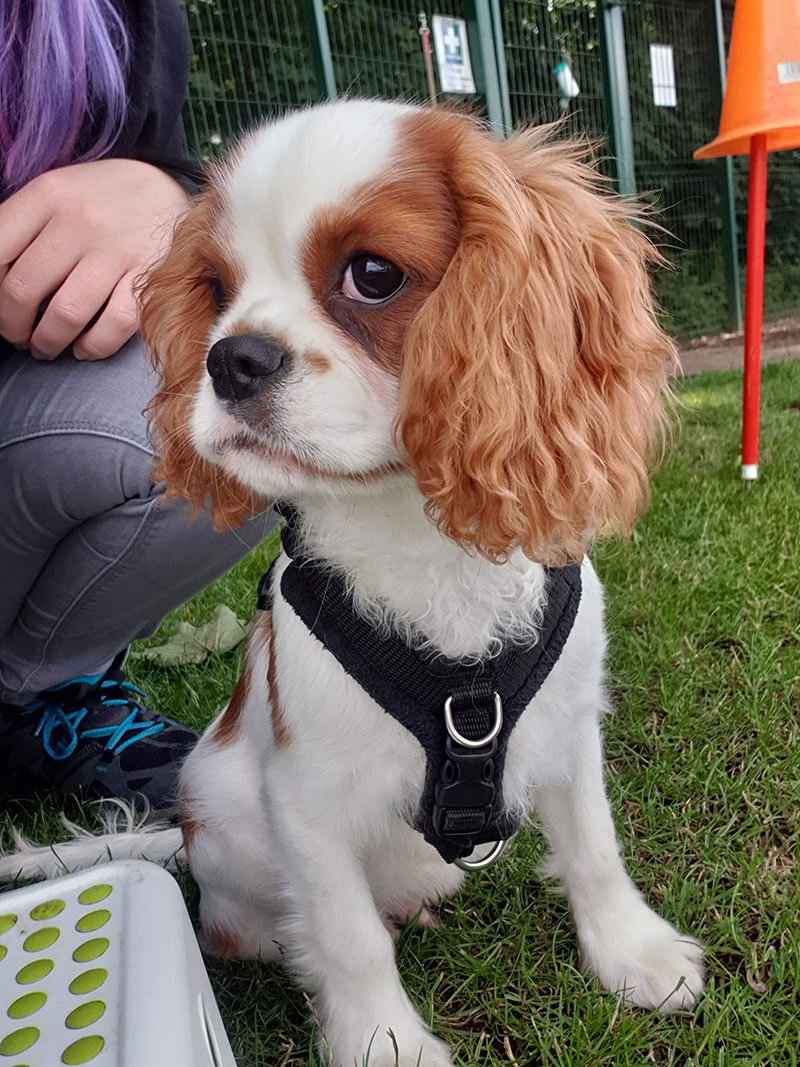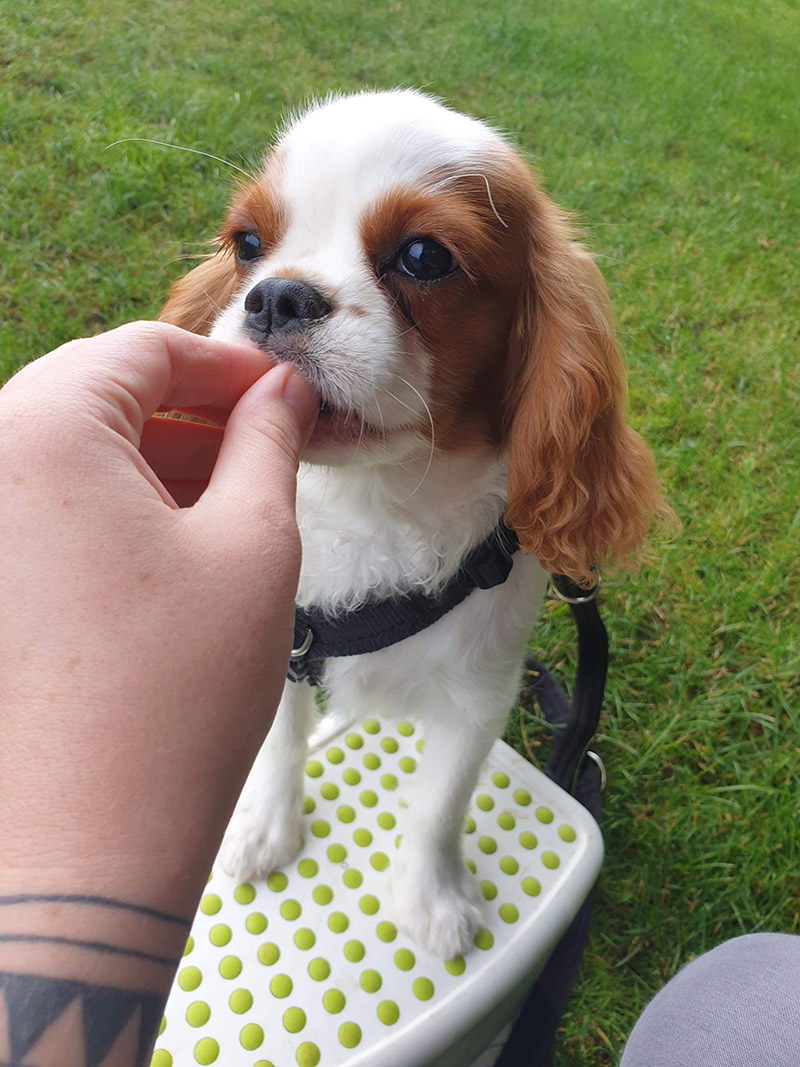31/07/2019 - Welcome to Best Behaviour Dog Training
Is home training just as good as enrolling your new puppy into training classes? That’s what this article is all about.
The average human will spend at least 14 years, (preschool to A-level), approximately 17% of their life in some sort of education. Human education teaches us social skills, life skills, and prepares us for a future career.
Dogs are intelligent mammals too and when they have good life-skills and great social skills they are loyal and trustworthy companions. A structured training program is vital for their wellbeing and indeed for their safety.
Here are 5 things that a puppy training class supplies.

Learning about meeting and greeting
As a dog behaviourist one of the most common problems I’m asked to help with is aggression towards other dogs. Aggression is usually a symptom of deep seated anxiety. Sometimes it’s triggered by a traumatic event, but quite often its roots lie in poor social skills.
Would you appreciate a stranger running up to you and jumping on your back? No? Neither would I and neither do most dogs. But an enthusiastic pup doesn’t necessarily have the social skills to know any different. Very often their enthusiasm risks a right royal telling off from the other dog. To avoid nasty incidents he or she needs practical lessons in meeting and greeting.
What about shy puppies? They may be unsure of strange dogs (or people) and feel worried when approached. In this scenario, the puppy’s body floods with adrenalin and he or she feels there are only 2 available options. Fight or flight. Realistically, a puppy on a lead only has one option, fight.
It doesn’t take a pup long to learn that barking, growling and even biting is a good way to deter the scary dog/child/person.
If a puppy learns very early on – and in a safe environment – how to read doggy body language and respond appropriately – problems with fearfulness or aggression will probably never arise. In fact, I recently read a piece of research on puppy classes which demonstrated that
behavioural cues.
You can read the full report here. I’ll also post the link at the end of the blog so that you can read it later.
Mixed classes mean stronger social skills
At Best Behaviour Dog Training we always advocate having a mixture of dogs in any class. Puppies are invited to learn alongside dogs of different ages, sizes, genders and temperaments. It’s Just like taking a human child to a family event and teaching it that Grandma must be treated with respect, Mum wants to be left alone to chat, but cousin Jack enjoys a good game of “tag”.
The social element of doggy lifeskills classes is almost impossible to replicate at home.
Games and equipment encourage learning through fun
Your puppy’s education should involve much more than just recall, sit and loose lead walking. It should allow the pup to develop confidence, coordination, impulse control and a sense of fun.
Our dog training techniques are tailored to your pup’s learning stage and they are progressive. What that means is that no matter what the other dogs in the class are doing, we’ll show you how to teach your pup the basics and to learn at a pace that’s comfortable for both of you. We gradually build on your ever increasing skills but never ask either of you to run before you can walk.
At home it’s tempting to try to move puppy along too fast. Unless those early training foundations are really strong, everything can unravel when you want to ask for more complicated behaviours like retrieving to hand. It’s like teaching a child the alphabet and then giving him Tolstoy’s War and Peace as his very first reading book
 .
.
The games we play in puppy and dog training classes help to build pathways in the brain so that behaviours are learnt for good. That way, your pet will be able to respond to your cues in any situation.
Dogs are very good at learning things in context. Eg they may listen to you at home but not when out and about. Training in class teaches pups how respond to cues wherever they are and whatever is going on around them. By coming to class and varying their training, the behaviours become cemented into the brain. (dog trainers call this “proofing” – ie the dog is proving that it understands the cue not just the context)
Tailored to you and your dog
Every dog-owner combination is different. One pup may think food is the best reward ever, another pup prefers a squeaky toy. A shy puppy needs help to feel motivated, a boisterous one needs help to calm down.
An experience dog trainer will help you to tailor your dog training techniques to your puppy’s individual character.
Communication and Getting the timing right
Reward based training is all about the timing. For example, when you are teaching your puppy the cue for “sit”, it’s vital that the reward comes the second that little furry bottom hits the floor. Reward as the butt lifts up and you are teaching the dog that the word “sit” actually means stand up.
It can be tricky to master that timing. Another pair of eyes can spot slip-ups and help you to correct them before anyone gets confused and frustrated.
Socialising for dog owners
Mums and babies have social groups where they share their worries and seek help. Crafters, sports people and gamers get together to help each other improve their skills and guess what – so do dog owners.
Our classes are all about small, sociable groups of people coming together to improve their dog training skills, celebrate their dog’s amazing characters and enjoy seeing their pups develop into mature dogs. Don’t worry, you won’t be forced to socialise with everyone, but we value your input and hope that you enjoy training with us.
Classes don’t necessarily fit in with everyone’s lifestyle but I would urge anyone with a new puppy to seriously consider some form of structured training, preferably with the guidance of a qualified dog trainer. If you do decide to join a puppy training class, remember to enrol in good time.
It’s never too early to start training. If puppy is not fully vaccinated yet, you can start with 1-2-1 sessions at home to prepare you and the pup for classes. Find out more here
Find out about puppy and dog training classes in Suffolk
Do puppy classes have an effect on a dog’s behaviour in adulthood?
Copyright © 2025 Best Behaviour Dog Training
Registered No. 12954178
Registered address: Poplar Hill, Stowmarket, Suffolk, IP14 2AX
Website design by Upshot Media Ltd